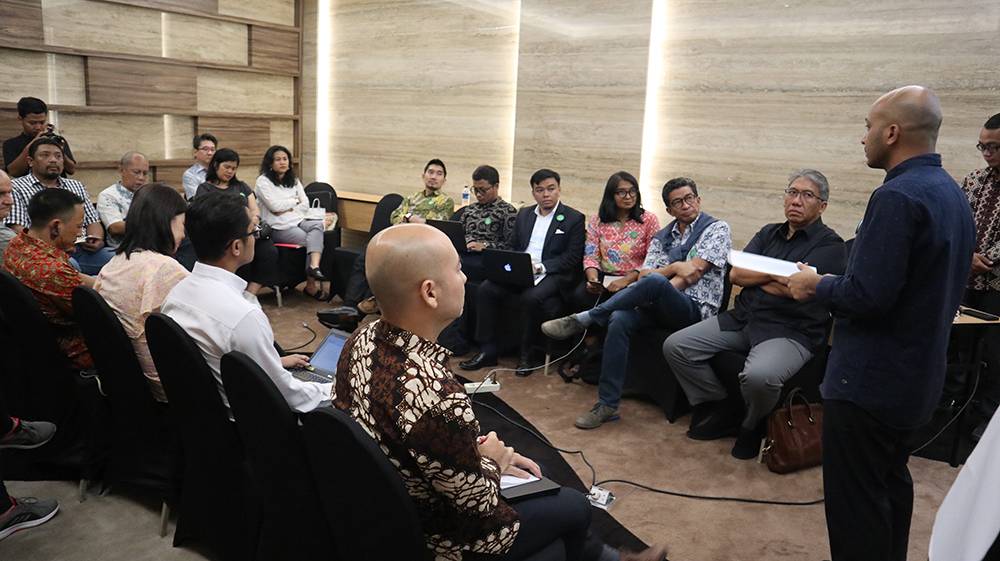Detail Activity

Activity Description
Jakarta (Indonesia), 31 August 2019 – This particular DISKO (Diskusi Kopi) attracted many participants and it was attended by more than 50 people from various different groups such as general public, farmers, roasters, and SCOPI Members and Partners from private sector namely Nestlé and Mayora. SCOPI invited prominent resource persons in Indonesia coffee industry and researcher. One important question to be explored is the understanding of private sector in sustainability and identifying problems in coffee industry and work together towards finding the right solutions.
The resources persons attending this session were Ms. Mira Yudhawati, General Manager of Boncafé Indonesia and Indonesia’s first female Q-grader, Mr. Andanu Prasetyo, cofounder and owner of Toko Tuku coffee, Mr. Ravid Annaba, coffee researcher and practitioner. Acting as the moderator was the Chairman of Executive Board, Irvan Helmi.
Each of the resources persons presented their problem statements that they have dealt with in the industry. Ms. Mira Yudhawati deeply regrets the reputation of Indonesian coffee among the international community. Indonesian coffee is known for its incosistency in quality, quantity, and price compared to coffee from other coffee producing countries such as Brazil.
As for Mr. Andanu Prasetyo, who started his business as a trendsetter of Indonesian milk-based coffee, stating that the main problem is the lack of information about the coffee industry itself. Then the gap between the rapily growing upstream industry is not followed by developments of the downstream industry. There is no agreement in the definition of Indonesia coffee itself amongst the players, making it challenging to promote and market Indonesian coffee abroad.
From academic perspective, Mr. Radiv Annaba, a young Indonesian researcher, said that Indonesia should be able to determine its own definition of sustainability and steps to be taken towards sustainability that are suitable and can be applied in Indonesia. There is no agreement on the definition of what is specialty coffee and the very lack of research and development in the coffee industry. In addition to bringing up the same problem, namely the development gap in its downstream and upstream industry, he also sees the absence of a good value chain from upstream to downstream. The absence of a bridge to connect the two ends further widens the gap. Coffee industry players in Indonesia should be able to see the synergy between the two ends of industries in Gayo Regency, Aceh, where all parties have clear understanding their respective roles to make the value chain works well and benefiting all parties involved in the industries. The last problem that is no less important is the difficulty of accessing data that captures the condition of the coffee industry itself.
Added by the participants are issued often encounter by coffee business owner abroad. Most of them find it difficult to obtain a wide variety of Indonesian coffee, the varieties that can be accessed are mostly originated from Sumatra and supplies must be obtained through large intermediary companies hence the price has increasingly become more expensive. Various complaints have been submitted to different parties such as the Indonesian Embassy, has received no follow up. Another issue arise is the number of missing links in the supply chain and there is no clear mapping of the stakeholders in the coffee industry.
The resource persons were asked to lead the discussion and provide feasible solution to each of problem statements.
Ms. Mira Yudhawati presented the recommendation/action plan from her group, the ideas are as follows:
A mediator or accessible communication tool to bridge the communication between the upstream and downstream industries. SCOPI program needs to be introduce widely and various activities carried out by different stakeholders must be well designed to produce tangible output
SCOPI needs to equip the farmers with knowledge and training on market insight in terms of quality of the coffee. The Master Trainer are expected to deliver the training modul based on the level of knowledge of the farmers.
SCOPI needs to providing information to the market that each type of coffee has different segmentation, there must be a uniformity or common theme in conveying this information to different market segments.
To encourage committed long-term partnership between farmers and buyers or consumers.
SCOPI to act as platform to accommodate different groups/stakeholders to exchange informations and ideas.
Mr. Andanu Prasetyo presented the recommendation/action plan from his group, the ideas are as follows:
SCOPI as a neutral platform to be able to gather all stakeholders or actors in the coffee industry to reach agreement on the definition of Indonesian coffee and document the decision.
To advocate at policy level to recommend concrete regulations to support the development of the Indonesian coffee industry.
To conduct study of a business model in the downstream industry and find the correct stimulus so that the downstream industry is able to be the active for the upstream industry.
To conduct research and development on how the coffee industry be able to collaborate with other leading commodities in Indonesia to create new products.
Mr. Radiv Annaba presented the recommendation/action plan from his group, the ideas are as follows:
SCOPI establishes research and development division to map out various variables related to coffee industry. The results can be presented as policy recommendation at government level.
Creating online purchasing platform to manage cash flow that occurs in the coffee industry in Indonesia and the platform later on can be used to assist in identifying the problem.
To increase public awareness about the idea of sustainability
To establish task force to draw work plan and assist in the implementation process
Providing the adequate human resources for implementation of activity
To establish business development unit to build coffee value chains.
SCOPI is very pleased to know that there is great concern from different actors in the coffee industry and hopefully an agreement can be reached to translate these inisiatives in to concrete activity.
We will conduct further discussion with our Members to map out the priorirties and concrete action plan to be implemented.
